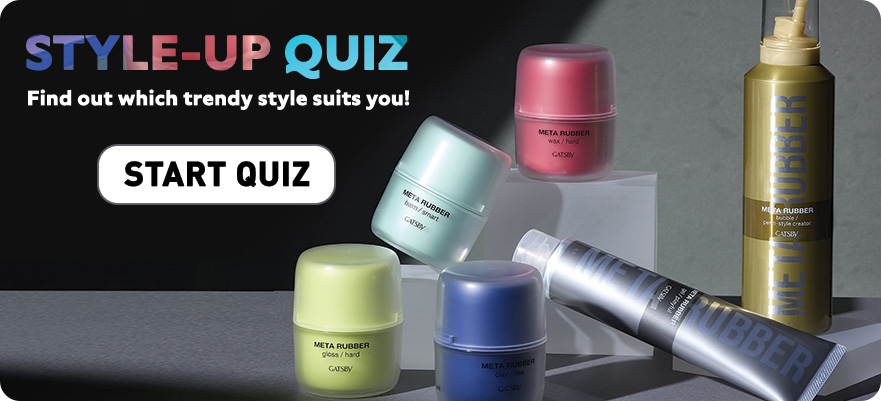A Sensitive Skin Care Routine for Men: Transform Your Look
Sensitive skin isn't just a women's issue. If you ask a group of men, you're bound to find that at least a handful have what they'd consider "sensitive skin." Today, we're exploring what it means to have sensitive skin, how to handle it, and tips for keeping this skin type healthy and looking top-notch.
Understanding Sensitive Skin for Men
Men and women can both be plagued by sensitive skin. However, men are affected differently. Many men have thicker skin, are more prone to an overproduction of oils, and have more body hair than women — all of which can contribute to skin sensitivity. Some may notice sensitive skin on their faces, often made worse by facial hair.
What Is Sensitive Skin?
Sensitive skin is skin that, in general, has a lower tolerance or is highly reactive to certain triggers it comes in contact with. In other words, it’s easily irritated by products, the weather, hormones, certain fabrics, and other factors that usually don't bother those with "normal" skin.
Everyday irritants can also include personal care products like cologne, body lotions, and shaving creams. But depending on how sensitive your skin is, it can literally be irritated by anything it comes in contact with.
Essentially, having sensitive skin means your skin can easily become upset, and it's important to identify and avoid triggers that cause it to react.
Common Signs of Sensitive Skin In Men

Deciphering whether you have sensitive skin or not is actually fairly simple. Looking back on past experiences using skin care products and topicals, can you think of a time (or two) when your skin was left red, itchy, burning, or feeling tight after use? If so, you might have sensitive skin!
Common signs of sensitive skin in men include (but are not limited to) itchiness, redness, a feeling of tightness, stinging, and even dry, flaky skin. These symptoms will often pop up after exposure to the environmental factors above or using topical products that do not agree with your skin.
Factors Contributing to Sensitive Skin In Men
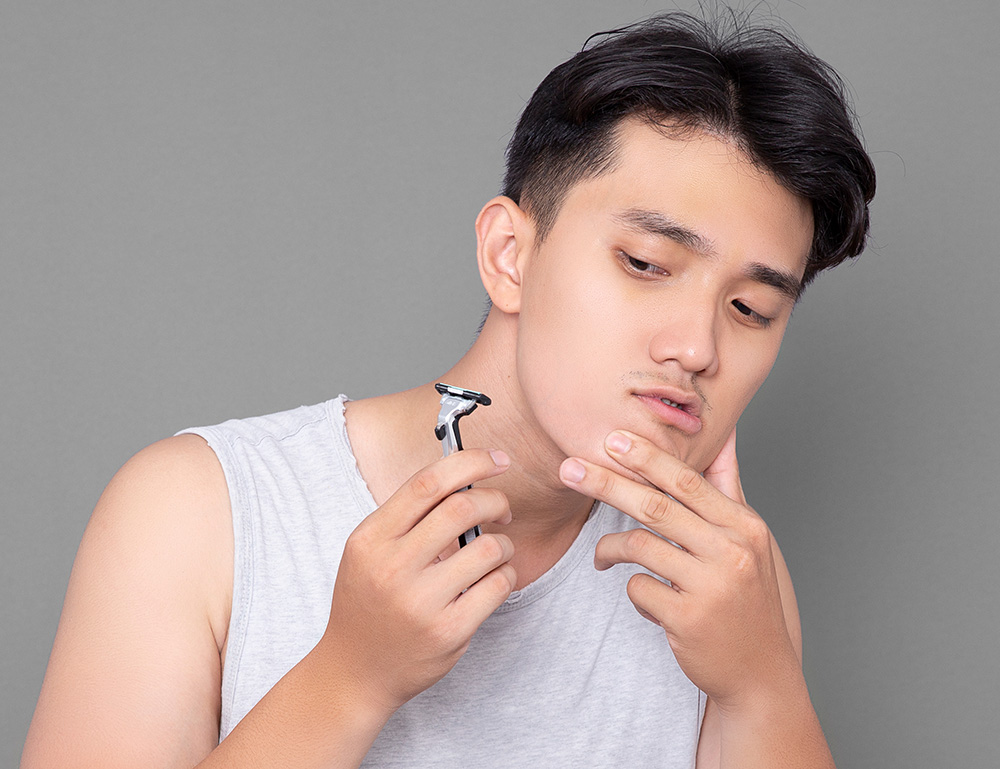
Unfortunately, environmental factors aren't the only things that contribute to sensitive skin. If you have this type of skin, other factors can also play into the severity of your flare-ups.
Stress is a significant factor because it affects your body's hormones, which in turn affects the skin. Long-term stress and the subsequent hormone increase can lead to skin problems such as sensitivity and dryness.
Shaving is another cause of inflammation. Shaving blades leave microscopic scratches on the skin, which can cause redness and inflammation regardless of skin type. Those with sensitive skin types particularly prone to irritation may want to consider a less irritating electric shaver.
Importance of a Tailored Skin Care Routine
A good, highly personalized skincare routine is essential for men of any age — but is particularly beneficial for men in their 20s and 30s. It's important for men within this age range because good skin care early on does wonders to stay cool as you age.
Why Men's Skin Needs Different Care

Although men and women can both suffer from sensitive skin, their skin care needs differ. A man's skin requires different care than a woman's because a man's skin is physically different. For example, men's skin features larger, more active sebum glands (in pores), which are responsible for producing the oil that can lead to acne.
In addition, men's skin is thought to appear 20% thicker than women's. With age, the collagen content is also believed to decrease more quickly than in female skin. Collagen is the component of the skin that helps keep the skin looking youthful and wrinkle-free. Take care of your skin while young, gents!
Men's skin is also prone to damage from shaving, which most men do regularly. The damage caused by shaving can exacerbate and even lead to sensitive skin.
The Impact of Neglecting Sensitive Skin
It's easy to neglect your skin — regardless of what kind of skin you have. Neglecting sensitive skin, though, can be costly to your appearance and confidence, as sensitive skin presents very outwardly when it flares up.
Once it flares up, sensitive skin can be hard to manage — even more so than before the flare-up happened. A situation that one could have managed with a simple skincare routine can become an uphill battle with your skin.
Essential Steps for a Sensitive Skin Care Routine
We’ve made articles on overall skin care, oily skin care, and dry skin care to help guys with all skin types keep their skin looking healthy and cool, but now it’s time for the next level.
If you're interested in making a change to improve your sensitive skin, you're probably wondering what to do and where to start. Luckily, we can help. There are a handful of short, beginner-friendly steps essential for developing a good skincare routine for your sensitive skin, and we're bringing them to you today.
Cleansing: Choosing the Right Product
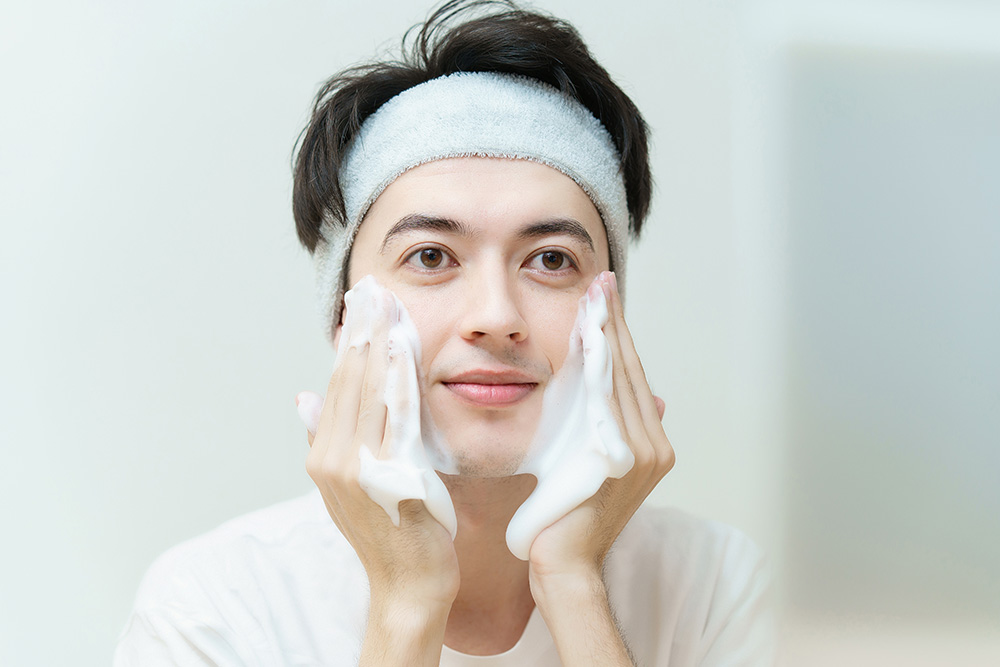
Using a cleanser is a great first step to any skincare routine — especially sensitive skin care routines. Cleansing effectively removes excess oil, debris, product, and germs so that the skin is left a clean, blank canvas for the skin care products that come next.
You'll want to choose a gentle cleanser specifically formulated for sensitive skin. Cleansers marketed for skin prone to irritation are generally milder, moisturizing, and have simpler formulas.
Exfoliating: How Often and With What?
Gentle exfoliation is the next step in any sensitive skincare routine, offering several benefits. This process unclogs pores, helping to prevent acne and improve skin texture when done properly. For men with sensitive skin, harsh exfoliation may cause irritation, but gentle exfoliation is a way to remove dead skin cells while reducing harm to your skin.
AHA (alpha hydroxy acid) and BHA (beta hydroxy acid) are popular examples of effective natural exfoliants, and they are water-soluble instead of oil-soluble. AHAs, like mandelic acid, can be effective in reducing fine lines, brightening skin tone, and hydrating the skin. BHAs, on the other hand, like salicylic acid, are said to penetrate deeper into the pores to remove excess oils and dead skin cells, making them ideal for treating blackheads and acne.
It's recommended not to over-exfoliate using either chemical or physical exfoliants. Exfoliating only once or twice a week is recommended — any more frequently can irritate sensitive skin and cause flare-ups and damage.
Moisturization: The Key to Hydration and Protection
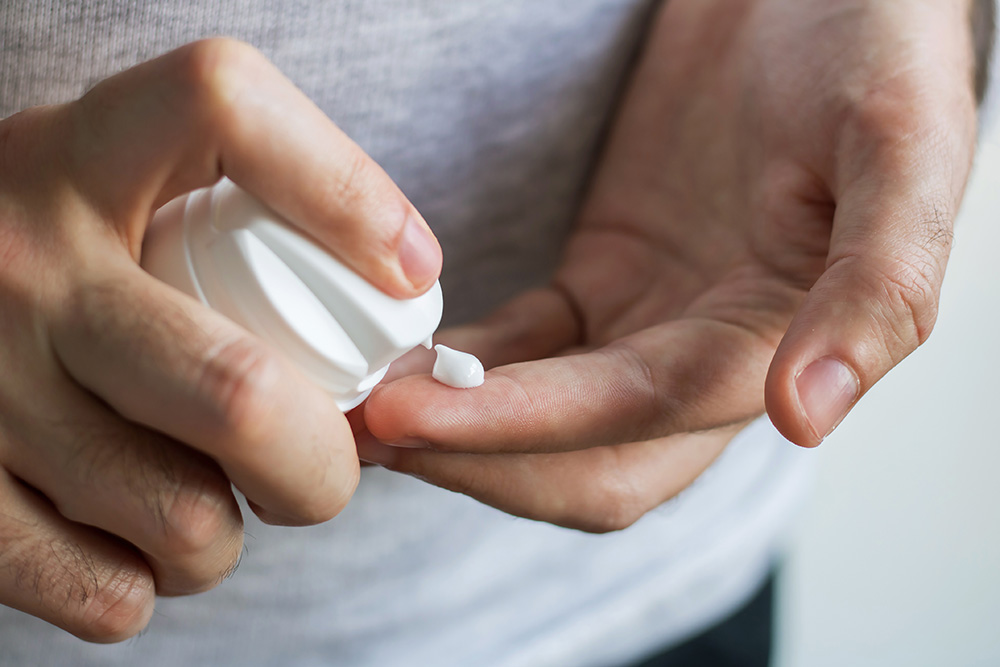
After you've cleansed, it's time to moisturize. If you have sensitive skin, it's likely that areas of your skin are also dry, making this step one of the most important.
This being said, it's highly recommended that you take your time when choosing a moisturizer — and keep in mind that just because a moisturizer says it is for sensitive skin, it may not be the best for your particular skin. If you find that it doesn’t work well with your skin, simply stop using the product.
Apply to damp skin that is clean and free of product. Gently massage the moisturizer into the skin using an upward motion, focusing primarily on the dry areas.
Sun Protection: Not Just for the Beach
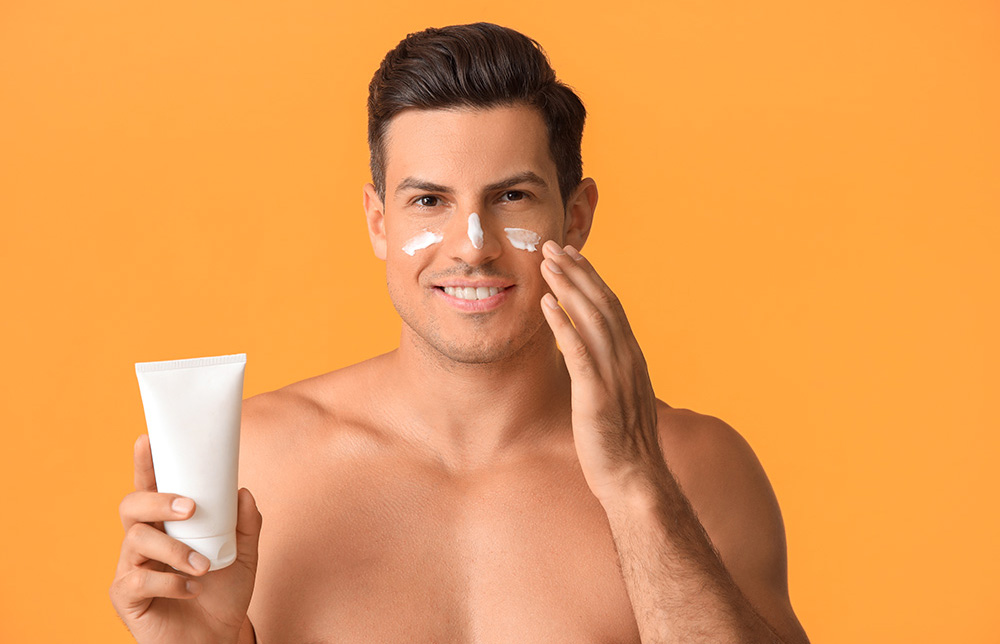

Now that you've cleansed and moisturized, you can move on to the next step: sun protection! Since the sun can do so much damage to the skin, sun protection is a step that shouldn't be skipped.
It’s recommended that your sunscreen be a broad-spectrum formula to protect you from UVA and UVB rays. SPF 30+ is a good example.
If you're spending time outdoors, it’s a good idea to reapply every two hours. However, if you're sweating or have been swimming, you may want to reapply more often. Be sure to dry your skin first and apply generously.
Additional Tips for Maintaining Healthy, Hydrated Skin
Even though developing and maintaining a skincare routine is a great way to care for your sensitive skin, skin sometimes requires a bit more attention. So, in addition to the super simple routine we've given you above, we're also happy to share a handful of more advanced tips and tricks to help your skin look its best.
Test the Ingredients
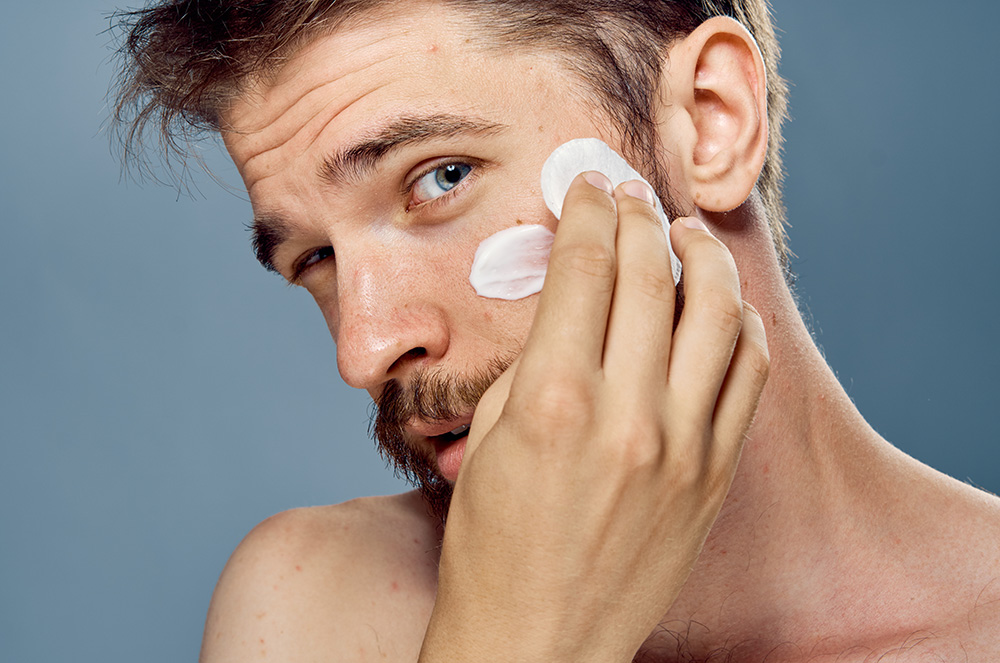
It’s a good idea for men with sensitive skin to check their product ingredient labels diligently. Product ingredients that work well for most men may be too harsh for your skin.
Once you decide on a product, do a skin test: apply the product to a small area of your skin before using it on your entire face. Spot testing will help you determine whether or not the product will irritate your skin.
The Role of Diet

Your diet plays a key role in the overall health of your sensitive skin. Eating a varied diet that is chalked full of foods that contain antioxidants, and vitamins such as A, B, C, and E are especially good for your skin and will provide your body with the nutrition it needs to regenerate healthy skin cells.
In addition, anti-inflammatory foods can be incredibly helpful — people with sensitive skin may be able to reduce future inflammation within the skin by eating them on a regular basis. Anti-inflammatory foods include things like berries, green tea, and turmeric. As their name suggests, these foods help reduce the inflammation within the skin and can aid in getting rid of redness.
The Importance of Sleep for Skin Health
Not getting enough sleep does a lot more than make you tired and grumpy. As it turns out, it also affects your immune system, metabolism, and skin. Experts recommend getting 7-9 hours of quality sleep each night.
Adequate amounts of sleep give the body the time it needs to recover from illnesses, regenerate new skin, and become energized after a long day. Consider switching to a silk pillowcase to make a night's beauty rest even more beneficial for your skin. Silk is soft and gentle on the skin and produces minimal amounts of friction, which can lead to acne and irritation.
Stress and Its Impacts on the Skin

Stress can be expressed through your skin. Stress stimulates the body to produce oil, which turns into acne — and if you have sensitive skin, you probably know that acne is hard to combat. The excess oil can also trigger other skin issues like eczema and psoriasis.
Incorporating stress management techniques into your daily routine, like yoga and meditation, can help you get through stressful situations without your skin flaring up.
Conclusion
Now that we've covered the bases, it's time for you to put your new knowledge into practice! Develop a skincare routine that is easy for you to follow and make time for each day, and watch your skin thrive.
